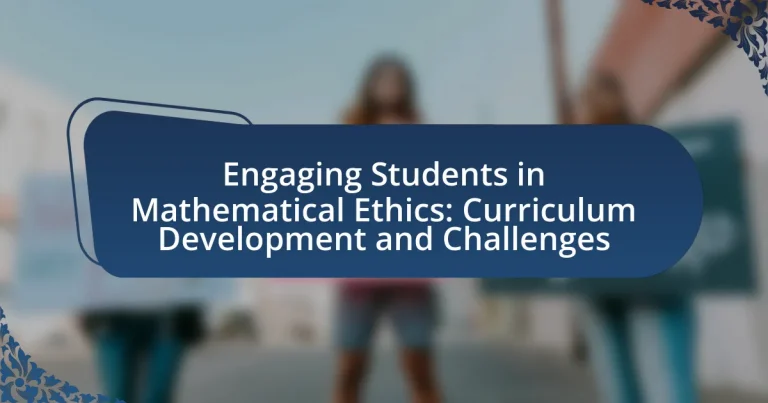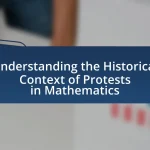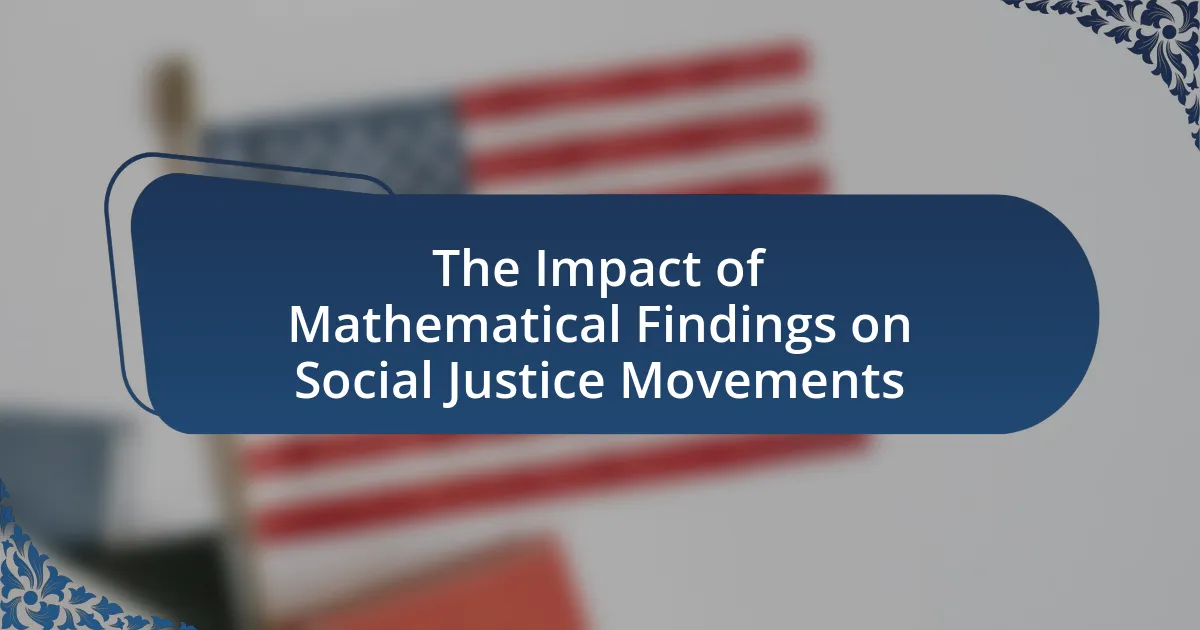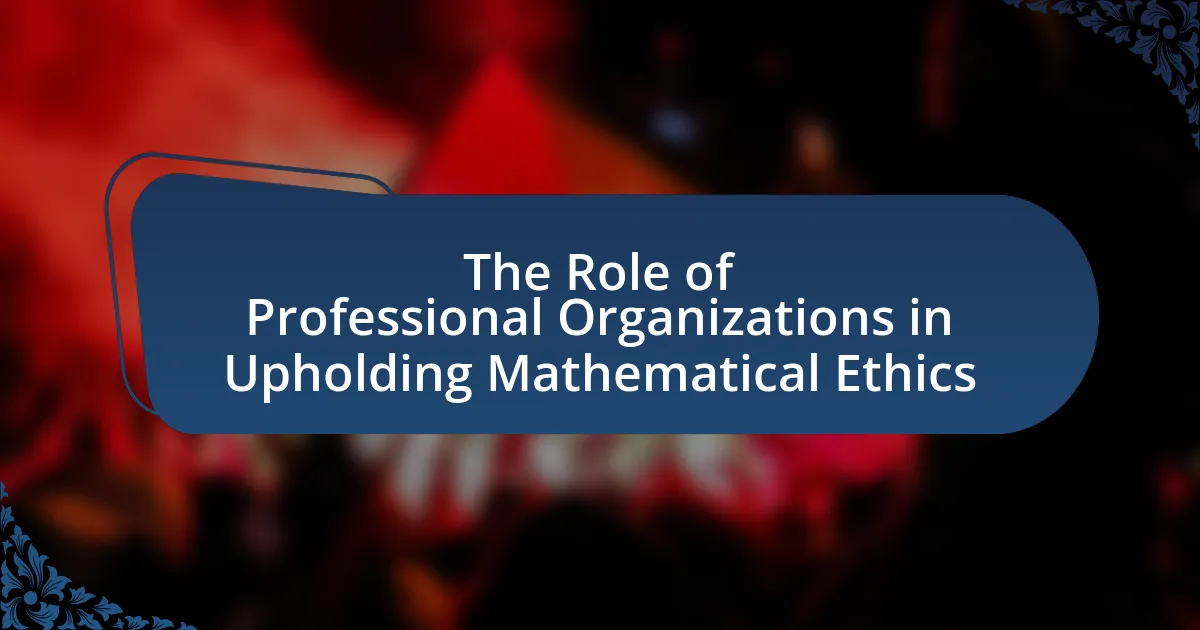Engaging students in mathematical ethics is a critical aspect of mathematics education that involves exploring the ethical implications of mathematical practices and theories. This article outlines the importance of integrating ethical considerations into the curriculum, highlighting key principles such as integrity, responsibility, fairness, and respect for intellectual property. It discusses how mathematical ethics enhances critical thinking, influences student decision-making, and prepares students for responsible citizenship. Additionally, the article addresses challenges in teaching mathematical ethics, including misconceptions, cultural differences, and resource limitations, while proposing strategies for effective curriculum development and assessment methods to foster student engagement.
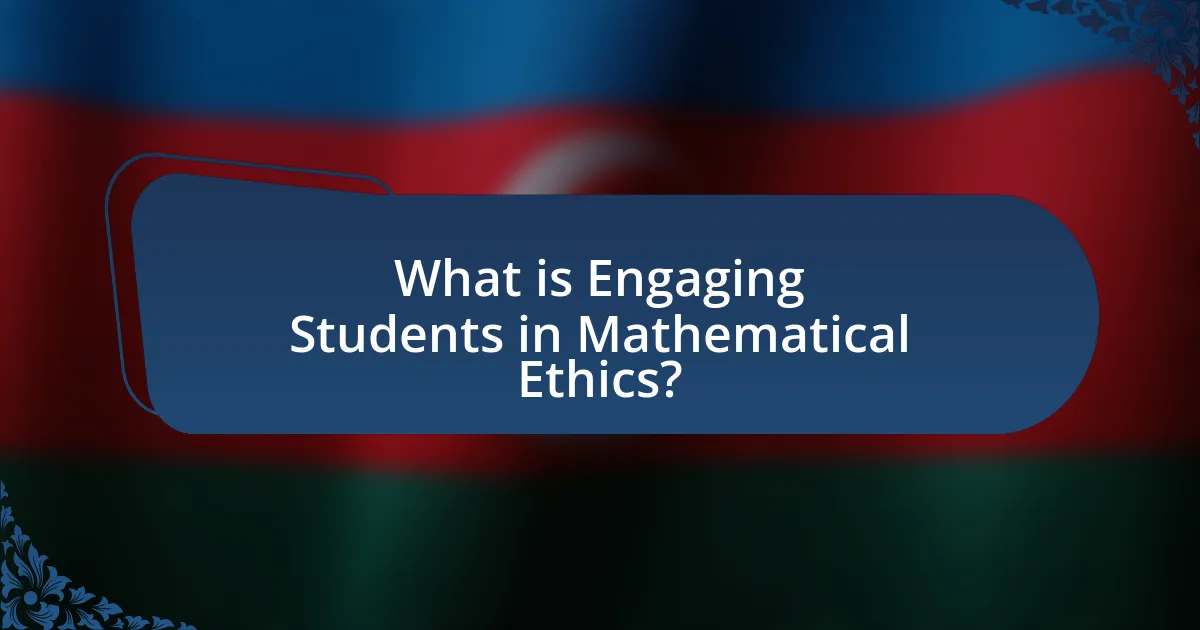
What is Engaging Students in Mathematical Ethics?
Engaging students in mathematical ethics involves actively involving them in discussions and activities that explore the ethical implications of mathematical practices and theories. This engagement can include analyzing real-world scenarios where mathematics intersects with ethical dilemmas, such as data privacy, algorithmic bias, and the social responsibilities of mathematicians. Research indicates that incorporating ethical considerations into mathematics education enhances critical thinking and prepares students to navigate complex moral landscapes in their future careers. For instance, a study by the American Mathematical Society highlights that students who engage with ethical issues in mathematics demonstrate improved problem-solving skills and a greater awareness of the societal impact of their work.
Why is Mathematical Ethics important in education?
Mathematical ethics is important in education because it fosters critical thinking and moral reasoning in students. By integrating ethical considerations into mathematical practices, students learn to recognize the implications of their work, such as the potential consequences of data misuse or algorithmic bias. Research indicates that ethical training in mathematics enhances students’ ability to make informed decisions, as evidenced by studies showing improved problem-solving skills when ethical dilemmas are included in the curriculum. This approach not only prepares students for responsible citizenship but also equips them with the tools to navigate complex societal issues related to mathematics, such as equity and justice in data representation.
What are the key principles of Mathematical Ethics?
The key principles of Mathematical Ethics include integrity, responsibility, fairness, and respect for the intellectual property of others. Integrity emphasizes honesty in mathematical work, ensuring that results are reported accurately and without fabrication. Responsibility involves acknowledging the potential impact of mathematical findings on society and making ethical decisions in their application. Fairness pertains to equitable treatment in collaborative work and the acknowledgment of contributions from others. Respect for intellectual property underscores the importance of giving credit to original ideas and avoiding plagiarism. These principles guide mathematicians in maintaining ethical standards in their work and interactions.
How does Mathematical Ethics influence student decision-making?
Mathematical Ethics significantly influences student decision-making by providing a framework for evaluating the moral implications of mathematical applications. This framework encourages students to consider the ethical consequences of their choices, such as the impact of algorithms on society or the fairness of statistical representations. Research indicates that when students engage with ethical dilemmas in mathematics, they develop critical thinking skills that enhance their ability to make informed decisions. For instance, a study by the National Council of Teachers of Mathematics highlights that integrating ethical discussions into math curricula leads to improved student engagement and a deeper understanding of the societal implications of mathematical practices.
What are the goals of engaging students in Mathematical Ethics?
The goals of engaging students in Mathematical Ethics include fostering critical thinking, promoting ethical reasoning, and enhancing awareness of the societal implications of mathematical practices. By integrating ethical considerations into mathematical education, students learn to evaluate the consequences of their work, understand the responsibilities of mathematicians, and apply ethical frameworks to real-world problems. Research indicates that students who engage with Mathematical Ethics develop a deeper appreciation for the role of mathematics in society, leading to more responsible and informed decision-making in their future careers.
How can engagement in Mathematical Ethics enhance critical thinking?
Engagement in Mathematical Ethics enhances critical thinking by encouraging students to analyze complex moral dilemmas related to mathematical practices and applications. This analytical process requires students to evaluate different perspectives, assess the implications of mathematical decisions, and justify their reasoning, thereby fostering deeper cognitive skills. Research indicates that students who participate in discussions about ethical issues in mathematics demonstrate improved problem-solving abilities and a greater capacity for reflective thinking, as they learn to navigate the intersection of mathematical theory and real-world ethical considerations.
What role does Mathematical Ethics play in developing responsible citizens?
Mathematical Ethics plays a crucial role in developing responsible citizens by instilling a sense of moral reasoning and critical thinking in the application of mathematical concepts. This ethical framework encourages individuals to consider the societal implications of mathematical decisions, such as fairness in data interpretation and the ethical use of algorithms. Research indicates that integrating Mathematical Ethics into curricula enhances students’ ability to navigate complex moral dilemmas, fostering a generation that prioritizes ethical considerations in their professional and personal lives. For instance, studies show that students exposed to ethical discussions in mathematics demonstrate improved decision-making skills and a greater awareness of the consequences of their actions, ultimately contributing to a more responsible and conscientious society.
What challenges exist in teaching Mathematical Ethics?
Teaching Mathematical Ethics faces several challenges, primarily due to the abstract nature of ethical concepts and the diverse backgrounds of students. The difficulty in bridging the gap between theoretical ethical frameworks and practical mathematical applications often leads to confusion among learners. Additionally, students may lack the necessary philosophical grounding, making it hard for them to engage with complex ethical dilemmas that arise in mathematical contexts. Research indicates that educators struggle to create a curriculum that effectively integrates ethical reasoning with mathematical problem-solving, as highlighted in studies on curriculum development in ethics education. Furthermore, the subjective nature of ethics can lead to varied interpretations, complicating discussions and assessments in the classroom.
What are common misconceptions about Mathematical Ethics?
Common misconceptions about Mathematical Ethics include the belief that it is solely about the application of mathematical principles to ethical dilemmas, rather than a distinct field that examines the ethical implications of mathematical practices and theories. Additionally, many assume that Mathematical Ethics is only relevant to mathematicians, ignoring its significance for professionals in fields like data science, finance, and engineering, where ethical considerations are crucial. Furthermore, some people think that Mathematical Ethics does not involve rigorous analysis or debate, when in fact it encompasses critical discussions on topics such as algorithmic bias and the ethical use of statistical data. These misconceptions can hinder the integration of ethical considerations into mathematical education and practice.
How do cultural differences impact the teaching of Mathematical Ethics?
Cultural differences significantly impact the teaching of Mathematical Ethics by influencing students’ perspectives on ethical reasoning and decision-making. For instance, in collectivist cultures, students may prioritize community welfare over individual rights, affecting their approach to ethical dilemmas in mathematics. Research indicates that cultural context shapes moral reasoning; for example, a study by Shweder et al. (1997) highlights how cultural frameworks dictate ethical priorities, which can lead to varied interpretations of mathematical ethics across different educational settings. Thus, educators must adapt their teaching strategies to accommodate these cultural nuances, ensuring that ethical discussions resonate with diverse student backgrounds.
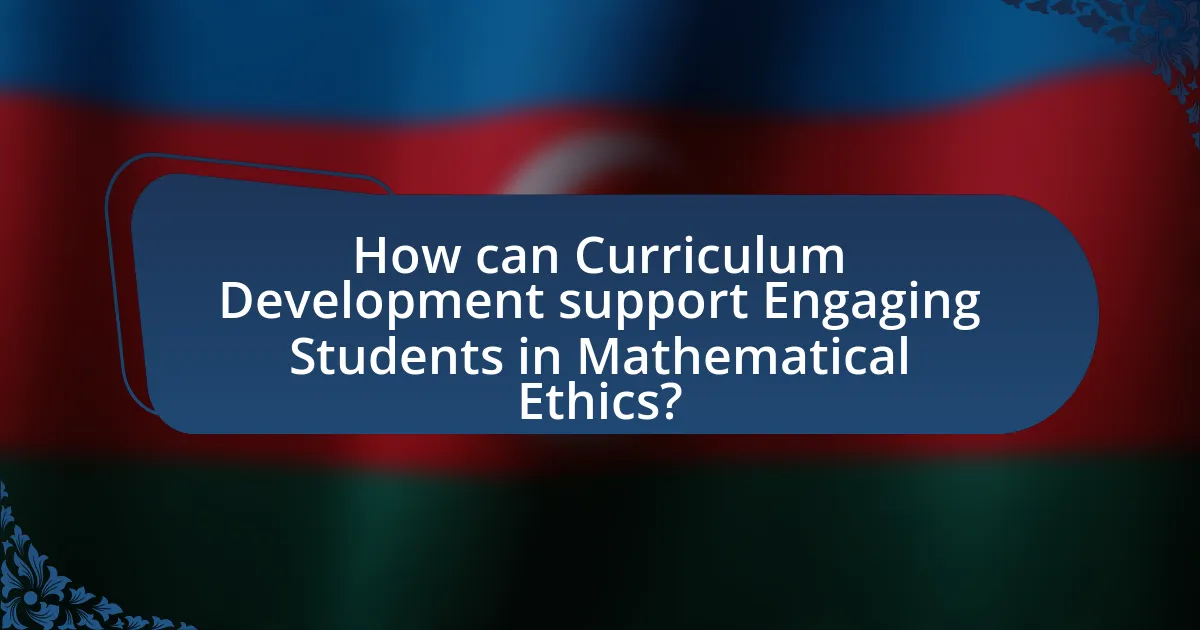
How can Curriculum Development support Engaging Students in Mathematical Ethics?
Curriculum development can support engaging students in mathematical ethics by integrating ethical dilemmas and real-world applications into mathematics lessons. This approach encourages critical thinking and allows students to explore the implications of mathematical concepts in societal contexts. For instance, incorporating case studies on data privacy or algorithmic bias can help students understand the ethical dimensions of mathematics. Research indicates that when students encounter ethical scenarios related to their studies, they are more likely to engage deeply with the material, fostering a sense of responsibility and awareness about the impact of mathematics in the real world.
What elements should be included in a Mathematical Ethics curriculum?
A Mathematical Ethics curriculum should include the following elements: foundational ethical theories, case studies in mathematics, the role of mathematics in society, ethical implications of mathematical modeling, and discussions on data privacy and algorithmic bias. Foundational ethical theories provide students with a framework for understanding moral reasoning, while case studies illustrate real-world applications and dilemmas faced by mathematicians. The role of mathematics in society emphasizes its impact on social justice and equity. Ethical implications of mathematical modeling address the responsibilities of mathematicians in their work, and discussions on data privacy and algorithmic bias highlight contemporary issues in technology and data usage. These elements collectively foster critical thinking and ethical awareness among students in the field of mathematics.
How can real-world applications be integrated into the curriculum?
Real-world applications can be integrated into the curriculum by incorporating project-based learning that connects theoretical concepts to practical scenarios. This approach allows students to engage with mathematical ethics through real-life case studies, simulations, and community projects that require ethical decision-making. Research indicates that students who participate in project-based learning demonstrate improved problem-solving skills and a deeper understanding of ethical implications in mathematics, as shown in studies like “Project-Based Learning: A Review of the Literature” by Thomas Markham, which highlights the effectiveness of this method in enhancing student engagement and learning outcomes.
What teaching methods are most effective for conveying Mathematical Ethics?
Interactive discussions and case studies are the most effective teaching methods for conveying Mathematical Ethics. These methods engage students in critical thinking and real-world applications, allowing them to explore ethical dilemmas in mathematics. Research indicates that active learning strategies, such as group discussions and problem-based learning, enhance students’ understanding of ethical principles by encouraging them to analyze and debate various scenarios. For instance, a study by the American Mathematical Society found that students who participated in case study discussions demonstrated a deeper comprehension of ethical issues compared to those who received traditional lectures. This evidence supports the effectiveness of interactive methods in teaching Mathematical Ethics.
How can educators assess student engagement in Mathematical Ethics?
Educators can assess student engagement in Mathematical Ethics through a combination of formative assessments, reflective journals, and participation in discussions. Formative assessments, such as quizzes and problem-solving tasks, allow educators to gauge students’ understanding and interest in ethical dilemmas related to mathematics. Reflective journals encourage students to articulate their thoughts and feelings about ethical issues, providing insights into their engagement levels. Additionally, active participation in class discussions and group projects can be monitored to evaluate how students interact with ethical concepts, demonstrating their engagement. Research indicates that these methods effectively capture student involvement and understanding in complex subjects like Mathematical Ethics.
What tools and techniques can be used for assessment?
Various tools and techniques for assessment in the context of engaging students in mathematical ethics include formative assessments, summative assessments, rubrics, peer assessments, and digital assessment platforms. Formative assessments, such as quizzes and reflective journals, provide ongoing feedback to students, allowing them to understand their learning progress. Summative assessments, like final projects or exams, evaluate student learning at the end of an instructional unit. Rubrics offer clear criteria for grading, ensuring consistency and transparency in evaluation. Peer assessments encourage collaboration and critical thinking, as students evaluate each other’s work. Digital assessment platforms, such as online quizzes and interactive simulations, facilitate immediate feedback and data collection, enhancing the assessment process. These methods are supported by educational research indicating their effectiveness in improving student engagement and understanding in complex subjects like mathematical ethics.
How can feedback be utilized to improve engagement?
Feedback can be utilized to improve engagement by providing students with specific, actionable insights that enhance their learning experience. When educators offer timely and constructive feedback, it helps students understand their strengths and areas for improvement, fostering a growth mindset. Research indicates that students who receive regular feedback are more likely to participate actively in their learning process, as it encourages them to reflect on their performance and make necessary adjustments. For instance, a study published in the “Journal of Educational Psychology” found that students who engaged with feedback showed a 30% increase in their overall engagement levels compared to those who did not receive feedback. This demonstrates that effective feedback mechanisms can significantly enhance student involvement and motivation in educational settings.
What resources are available for developing a Mathematical Ethics curriculum?
Resources available for developing a Mathematical Ethics curriculum include academic journals, textbooks, online courses, and professional organizations. Academic journals such as “Ethics and Mathematics” provide peer-reviewed articles that explore ethical dilemmas in mathematics. Textbooks like “Mathematics and Ethics: A New Perspective” offer structured content on the subject. Online platforms such as Coursera and edX feature courses on ethics in mathematics, allowing educators to access diverse teaching materials. Additionally, organizations like the Mathematical Association of America (MAA) and the American Mathematical Society (AMS) offer resources, workshops, and conferences focused on integrating ethics into mathematics education. These resources collectively support the development of a comprehensive curriculum that addresses ethical considerations in mathematical practices.
What role do professional organizations play in curriculum development?
Professional organizations play a crucial role in curriculum development by providing expertise, resources, and standards that guide educational practices. These organizations, such as the National Council of Teachers of Mathematics, contribute to curriculum frameworks by conducting research, offering professional development, and establishing best practices that align with current educational needs. For instance, they often publish guidelines and position statements that inform educators on effective teaching strategies and content relevance, ensuring that curricula remain up-to-date and effective in engaging students.
How can technology enhance the teaching of Mathematical Ethics?
Technology can enhance the teaching of Mathematical Ethics by providing interactive platforms that facilitate real-world problem-solving and ethical decision-making scenarios. For instance, online simulations and software tools allow students to engage with complex mathematical models while considering ethical implications, such as fairness and bias in algorithms. Research indicates that using technology in education increases student engagement and understanding; a study by the National Education Association found that technology integration can improve critical thinking skills by 21%. Additionally, digital resources, such as online forums and collaborative tools, enable students to discuss and debate ethical issues in mathematics, fostering a deeper understanding of the subject.
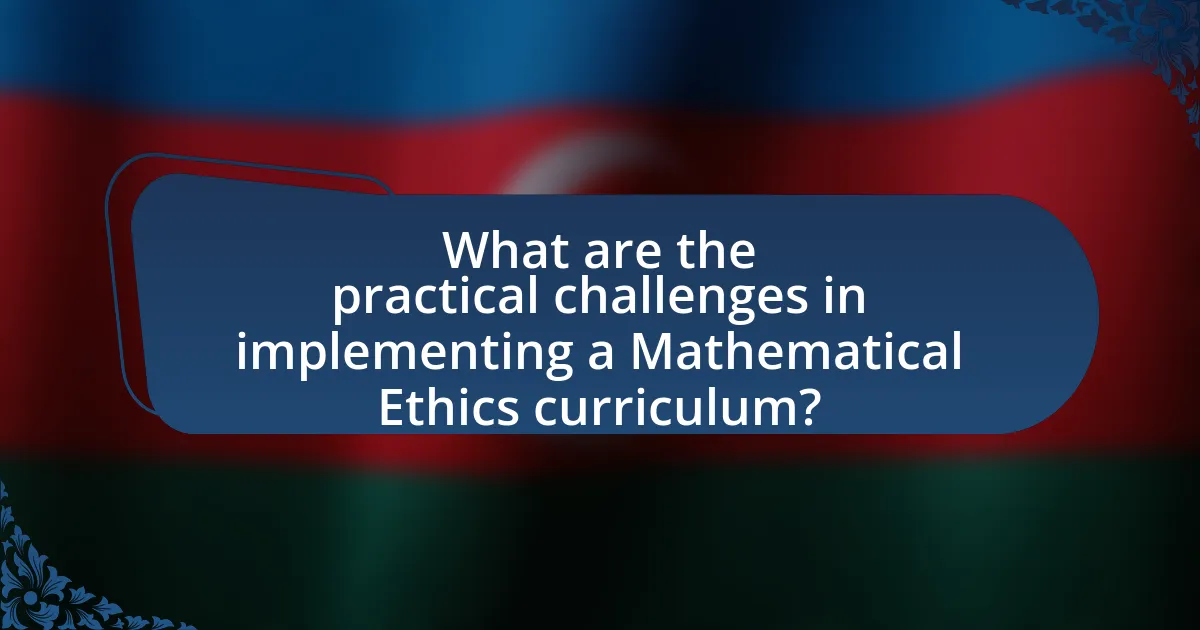
What are the practical challenges in implementing a Mathematical Ethics curriculum?
The practical challenges in implementing a Mathematical Ethics curriculum include a lack of standardized content, insufficient training for educators, and difficulty in assessing student understanding. The absence of a universally accepted framework for Mathematical Ethics leads to inconsistencies in what is taught across different institutions. Additionally, many educators may not have the necessary background or resources to effectively teach this interdisciplinary subject, which combines mathematics with ethical considerations. Furthermore, evaluating students’ grasp of ethical implications in mathematical contexts poses a challenge, as traditional assessment methods may not adequately capture their understanding of complex ethical dilemmas.
What barriers do educators face in teaching Mathematical Ethics?
Educators face several barriers in teaching Mathematical Ethics, including a lack of curriculum resources, insufficient training, and student disengagement. The absence of established teaching materials makes it difficult for educators to effectively convey ethical concepts in mathematics. Additionally, many educators report feeling unprepared to teach this interdisciplinary subject due to limited professional development opportunities focused on ethics in mathematics. Furthermore, students often struggle to see the relevance of ethical considerations in mathematical contexts, leading to decreased motivation and engagement in the subject matter. These barriers collectively hinder the effective teaching and learning of Mathematical Ethics.
How can limited resources affect curriculum implementation?
Limited resources can significantly hinder curriculum implementation by restricting access to essential materials, technology, and trained personnel. For instance, schools with inadequate funding may lack the necessary textbooks, software, or equipment required for effective teaching, which directly impacts the quality of education delivered. Research indicates that schools with lower financial resources often experience higher teacher turnover rates and lower student engagement, as evidenced by a study from the National Center for Education Statistics, which found that schools in high-poverty areas are less likely to have access to advanced coursework and experienced educators. Consequently, these limitations can lead to a curriculum that is not fully realized, ultimately affecting student learning outcomes and engagement in subjects like mathematical ethics.
What strategies can overcome resistance from students or institutions?
To overcome resistance from students or institutions, implementing collaborative learning strategies is effective. Collaborative learning fosters a sense of community and shared responsibility among students, which can reduce resistance by promoting engagement and ownership of the learning process. Research indicates that when students work together on projects, they are more likely to develop positive attitudes toward the subject matter, as evidenced by a study published in the Journal of Educational Psychology, which found that collaborative learning environments significantly enhance student motivation and reduce anxiety (Johnson & Johnson, 2014). Additionally, providing clear communication about the relevance of mathematical ethics in real-world applications can further mitigate resistance, as students are more likely to engage when they understand the practical implications of their studies.
How can collaboration enhance the teaching of Mathematical Ethics?
Collaboration can enhance the teaching of Mathematical Ethics by fostering diverse perspectives and promoting critical thinking among students. When educators work together, they can integrate interdisciplinary approaches that connect mathematical concepts with ethical implications, making the subject more relevant and engaging. For instance, collaborative projects involving mathematics, philosophy, and social sciences can help students understand the real-world consequences of mathematical decisions, such as in data privacy or algorithmic bias. Research indicates that collaborative learning environments improve student engagement and retention of complex concepts, as seen in studies conducted by Johnson and Johnson (1999) which highlight the effectiveness of cooperative learning strategies in educational settings.
What partnerships can be formed to support curriculum development?
Partnerships that can be formed to support curriculum development include collaborations with educational institutions, industry stakeholders, non-profit organizations, and community groups. Educational institutions can provide expertise and resources, while industry stakeholders can offer real-world applications and insights into current trends. Non-profit organizations often focus on specific educational goals and can contribute funding or materials, and community groups can help ensure that the curriculum is relevant to local needs. These partnerships enhance the curriculum by integrating diverse perspectives and resources, ultimately leading to a more comprehensive educational experience.
How can interdisciplinary approaches benefit the teaching of Mathematical Ethics?
Interdisciplinary approaches can enhance the teaching of Mathematical Ethics by integrating diverse perspectives and methodologies from various fields, such as philosophy, sociology, and computer science. This integration allows students to understand the ethical implications of mathematical concepts in real-world contexts, fostering critical thinking and ethical reasoning. For instance, incorporating philosophical discussions on ethics can help students grapple with moral dilemmas related to data privacy and algorithmic bias, which are increasingly relevant in today’s digital age. Research indicates that students exposed to interdisciplinary curricula demonstrate improved engagement and retention of ethical principles, as they can relate mathematical theories to practical applications and societal impacts.
What best practices can educators adopt for successful engagement?
Educators can adopt interactive teaching methods, such as collaborative learning and problem-based learning, to enhance student engagement. Research indicates that these approaches foster critical thinking and deeper understanding, as evidenced by a study published in the Journal of Educational Psychology, which found that students in collaborative settings demonstrated higher achievement and motivation levels compared to traditional lecture-based instruction. Additionally, incorporating real-world applications of mathematical ethics into the curriculum can make the subject matter more relevant and engaging for students, as highlighted by the National Council of Teachers of Mathematics, which emphasizes the importance of contextual learning in mathematics education.
How can educators create an inclusive environment for discussing Mathematical Ethics?
Educators can create an inclusive environment for discussing Mathematical Ethics by implementing diverse teaching strategies that acknowledge and respect different perspectives. This can be achieved through collaborative learning, where students engage in group discussions that encourage sharing of varied viewpoints, fostering a sense of belonging. Research indicates that inclusive pedagogies, such as culturally relevant teaching, enhance student engagement and understanding of ethical implications in mathematics (Ladson-Billings, 1994). Additionally, incorporating real-world ethical dilemmas related to mathematics can help students relate personally to the subject matter, making discussions more relevant and inclusive.
What ongoing professional development opportunities are available for educators?
Ongoing professional development opportunities for educators include workshops, online courses, and conferences focused on curriculum development and pedagogical strategies. For instance, organizations like the National Council of Teachers of Mathematics (NCTM) offer resources and events that specifically address mathematical ethics and curriculum challenges. Additionally, universities and educational institutions frequently provide certification programs and seminars that enhance educators’ skills in engaging students effectively. These opportunities are essential for educators to stay updated with current teaching methodologies and ethical considerations in mathematics education.
